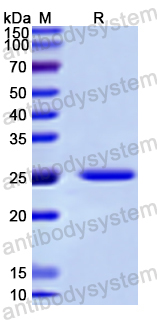Catalog No.
YHH24801
Expression system
E. coli
Species
Homo sapiens (Human)
Protein length
Met1-Ala207
Predicted molecular weight
25.09 kDa
Nature
Recombinant
Endotoxin level
Please contact with the lab for this information.
Purity
>90% as determined by SDS-PAGE.
Accession
Q16206
Applications
ELISA, Immunogen, SDS-PAGE, WB, Bioactivity testing in progress
Form
Lyophilized
Storage buffer
Lyophilized from a solution in PBS pH 7.4, 0.02% NLS, 1mM EDTA, 4% Trehalose, 1% Mannitol.
Reconstitution
Reconstitute in sterile water for a stock solution. A copy of datasheet will be provided with the products, please refer to it for details.
Shipping
In general, proteins are provided as lyophilized powder/frozen liquid. They are shipped out with dry ice/blue ice unless customers require otherwise.
Stability and Storage
Use a manual defrost freezer and avoid repeated freeze thaw cycles. Store at 2 to 8°C for frequent use. Store at -20 to -80°C for twelve months from the date of receipt.
Alternative Names
tNOX, Ecto-NOX disulfide-thiol exchanger 2, Cytosolic ovarian carcinoma antigen 1, ENOX2, APK1 antigen, Tumor-associated hydroquinone oxidase, COVA1
Ecto-NOX Disulfide-Thiol Exchanger 2 (ENOX2/tNOX) Is a Potential Prognostic Marker in Primary Malignant Melanoma and May Serve as a Therapeutic Target., PMID:39519404
Water-soluble 4-(dimethylaminomethyl)heliomycin exerts greater antitumor effects than parental heliomycin by targeting the tNOX-SIRT1 axis and apoptosis in oral cancer cells., PMID:38567911
ENOX2 NADH Oxidase: A BCR-ABL1-Dependent Cell Surface and Secreted Redox Protein in Chronic Myeloid Leukemia., PMID:37026766
Bis(chloroacetamidino)-Derived Heteroarene-Fused Anthraquinones Bind to and Cause Proteasomal Degradation of tNOX, Leading to c-Flip Downregulation and Apoptosis in Oral Cancer Cells., PMID:36230644
Capsaicin exerts therapeutic effects by targeting tNOX-SIRT1 axis and augmenting ROS-dependent autophagy in melanoma cancer cells., PMID:34659883
Capsaicin Targets tNOX (ENOX2) to Inhibit G1 Cyclin/CDK Complex, as Assessed by the Cellular Thermal Shift Assay (CETSA)., PMID:31635402
Immune response evoked by tumor-associated NADH oxidase (tNOX) confers potential inhibitory effect on lung carcinoma in a mouse model., PMID:31106000
Engagement with tNOX (ENOX2) to Inhibit SIRT1 and Activate p53-Dependent and -Independent Apoptotic Pathways by Novel 4,11-Diaminoanthra[2,3-b]furan-5,10-diones in Hepatocellular Carcinoma Cells., PMID:30909652
Regulation of tNOX expression through the ROS-p53-POU3F2 axis contributes to cellular responses against oxaliplatin in human colon cancer cells., PMID:30029680
Identifying stably expressed housekeeping genes in the endometrium of fertile women, women with recurrent implantation failure and recurrent miscarriages., PMID:29093507
Tumor-associated NADH oxidase (tNOX)-NAD+-sirtuin 1 axis contributes to oxaliplatin-induced apoptosis of gastric cancer cells., PMID:28122359
ENOX2 (or tNOX): a new and old molecule with cancer activity involved in tumor prevention and therapy., PMID:27655481
Capsaicin Inhibits Multiple Bladder Cancer Cell Phenotypes by Inhibiting Tumor-Associated NADH Oxidase (tNOX) and Sirtuin1 (SIRT1)., PMID:27367652
Update on a tumor-associated NADH oxidase in gastric cancer cell growth., PMID:26973386
ENOX2-based early detection (ONCOblot) of asbestos-induced malignant mesothelioma 4-10 years in advance of clinical symptoms., PMID:26807072
Sirtuin 1 (SIRT1) Deacetylase Activity and NAD⁺/NADH Ratio Are Imperative for Capsaicin-Mediated Programmed Cell Death., PMID:26255724
ENOX2 target for the anticancer isoflavone ME-143., PMID:25700353
Cancer prevention trial of a synergistic mixture of green tea concentrate plus Capsicum (CAPSOL-T) in a random population of subjects ages 40-84., PMID:24393573
TGF-β1 suppression of microRNA-450b-5p expression: a novel mechanism for blocking myogenic differentiation of rhabdomyosarcoma., PMID:23665678
Chemotherapeutic agents enhance cell migration and epithelial-to-mesenchymal transition through transient up-regulation of tNOX (ENOX2) protein., PMID:22846226
Phosphorylation of serine-504 of tNOX (ENOX2) modulates cell proliferation and migration in cancer cells., PMID:22659163
Down-regulation of tumor-associated NADH oxidase, tNOX (ENOX2), enhances capsaicin-induced inhibition of gastric cancer cell growth., PMID:21735133
hnRNP F directs formation of an exon 4 minus variant of tumor-associated NADH oxidase (ENOX2)., PMID:21625959
Essential role of copper in the activity and regular periodicity of a recombinant, tumor-associated, cell surface, growth-related and time-keeping hydroquinone (NADH) oxidase with protein disulfide-thiol interchange activity (ENOX2)., PMID:20922471
Reciprocal relationship between cytosolic NADH and ENOX2 inhibition triggers sphingolipid-induced apoptosis in HeLa cells., PMID:20518072
Omega-3 but not omega-6 unsaturated fatty acids inhibit the cancer-specific ENOX2 of the HeLa cell surface with no effect on the constitutive ENOX1., PMID:22435614
Downstream targets of altered sphingolipid metabolism in response to inhibition of ENOX2 by phenoxodiol., PMID:19734127
ECTO-NOX (ENOX) proteins of the cell surface lack thioredoxin reductase activity., PMID:19734126
Effect of Ccapsaicin on tNOX (ENOX2) protein expression in stomach cancer cells., PMID:19734122
Cancer type-specific tNOX isoforms: A putative family of redox protein splice variants with cancer diagnostic and prognostic potential., PMID:19734121
Phenoxodiol treatment alters the subsequent response of ENOX2 (tNOX) and growth of hela cells to paclitaxel and cisplatin., PMID:19156549
Molecular cloning and characterization of a candidate human growth-related and time-keeping constitutive cell surface hydroquinone (NADH) oxidase., PMID:19055324
Cell size increased in tissues from transgenic mice overexpressing a cell surface growth-related and cancer-specific hydroquinone oxidase, tNOX, with protein disulfide-thiol interchange activity., PMID:18980249
Early developmental expression of a normally tumor-associated and drug-inhibited cell surface-located NADH oxidase (ENOX2) in non-cancer cells., PMID:18704408
Antisense experiments demonstrate an exon 4 minus splice variant mRNA as the basis for expression of tNOX, a cancer-specific cell surface protein., PMID:18351130
Alternative splicing as the basis for specific localization of tNOX, a unique hydroquinone (NADH) oxidase, to the cancer cell surface., PMID:17924659

